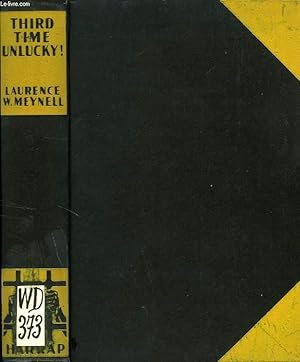
Chris Jansen is a harassed young man. His landlady is asking for her rent to be paid. His fabrication that he is about to inherit money is unravelling. His boss, Arthur Stevens, according to him, does not appreciate his talents. And Julian Bayleck, a moneylender he had borrowed money from is threatening him with dire consequences. When the novel opens, Chris has received a letter from the moneylender which he can no longer ignore. He decides to visit Bayleck after office. However when he reaches over there, he finds the moneylender shot through the head. He also discovers Doris Stevens, his boss’s wife hiding behind a curtain. Before Chris can quite get his head around all these things, Doris runs away. Chris recovers his wits enough to collect the loan diary from the moneylender’s table and leave.
Inspector James Hobbs who is teased by his colleagues because of his name being almost the same as the famous cricketer, Jack Hobbs, finds no clues whatsoever while investigating the murder of Bayleck. Meanwhile Doris who had been a chorus girl before marrying Arthur believes herself to be safe having no idea that the young man who saw her is actually an employee of her husband’s. When Chris arrives from the office bearing a message from her husband she is at first taken aback but quickly masters the situation. Soon Doris and Chris are having an affair. And now after having tasted success at her first murder, Doris starts plotting the murder of her husband whose miserliness is driving her mad and whose staid life is boring to her after the adventures of the stage. She ropes in Chris also in her plotting. Will she succeed this time too?
There is nothing new in the story in which a pair of lovers plot the murder of a spouse but Meynell tells the story well and I was thoroughly engrossed by the unfolding of this tale of lust and cupidity. Inspector Hobbs however has no presence at all and his solving the case also depends a lot on coincidence. In contrast, the other characters stand out and I was both repulsed by and sympathetic towards the conspirators. I definitely want to read more of this author. Have you read him?
*
First Line: “There’s a letter for Mr Jansen, Ma.”
Publication Details: 1935. London: George G. Harrap & Co., 1935
Dedication: H.M. – A.M.M. Michaelmas Day 1885 to 1935.
Pages: 303
Trivia: Basis for the 1936 film Crown v. Stevens

As I was reading your post, Neeru, I was thinking of other stories I’ve read where lovers plot the murder of a spouse; you’re right that that’s not a new idea. But when it’s done well, it can draw the reader in, as any well-told tale can. And it sounds as though many of the characters are fleshed out. It’s interesting that you mention the inspector is not as well developed as a character. It may be just me, but I have a sense that police detectives weren’t given as much depth as characters during the Golden Age years. Perhaps I’m wrong, In either case, this one does sound appealing.
LikeLike
Even I was surprised how much I liked the novel, Margot, since the plot is nothing new. I guess it must be because of the good characterization. Perhaps I was a little tough on Inspector Hobbs who did have a few good scenes with his daughter because as you rightly pointed out Golden Age detectives do not have much of a depth. Still, I find them better than the newer ones who go to the other extreme of alcoholism, dysfunctional relationships, angst et al….
LikeLike
This author is totally new to me. But if I find any of his mystery novels, I will give one a try. Fantastic Fiction shows him as having written children’s fiction also.
LikeLike
New to me too, Tracy. Going by this book he really ought to be better known. If you are able to read his books, I’d love to know your views. I wonder how his children’s fiction is.
LikeLike
A new to me name Neeru. But must look up the book or others as the storytelling seems good.
LikeLike
A new name for me too, Mallika. Do let me know if you find other books of his as I would love to read more of him.
LikeLiked by 1 person
Just noticed from Wikipedia that he wrote under various pseudonyms as well.
LikeLike
Thanks for letting me know Mallika. I will have a look.
LikeLiked by 1 person
New author to me, too. Does sound promising. Your description of the plot made me wonder–I see The Postman Always Rings Twice came out in 1934, but maybe it’s still a pretty new plot idea at the time? I wonder if could have been thinking of the Cain novel.
LikeLike
That reminds me that I have to read The Postman Always rings Twice. I loved the movie, I wonder if the novel is as good. And as you say, Meynell might have been influenced by Cain’s novel.
LikeLike